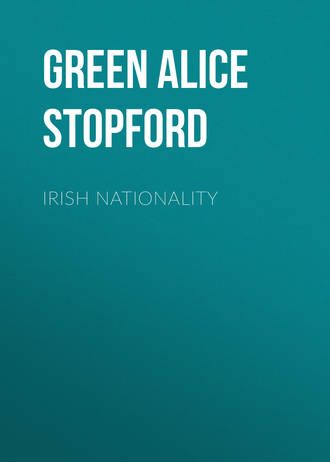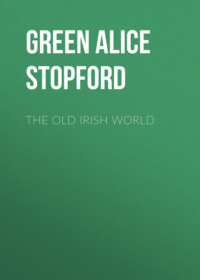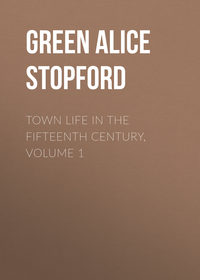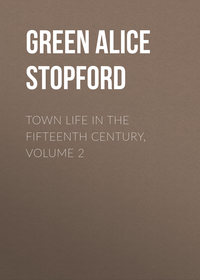 полная версия
полная версияIrish Nationality
These men were nearly all Protestants; they were all patriots. Potent Irish influences could have stirred a resident gentry and resident parliament with a just pride in the great memorials of an Ireland not dead but still living in the people's heart. The failure of the hope was not the least of the evils of the Union. The drift of landlords to London had broken a national sympathy between them and the people, which had been steadily growing through the eighteenth century. Their sons no longer learned Irish, nor heard the songs and stories of the past. The brief tale of the ordnance survey has given us a measure of the intelligence that had been wasted or destroyed by neglect in Ireland. Archbishop Whately proposed to use the new national schools so as to make this destruction systematic, and to put an end to national traditions. The child who knew only Irish was given a teacher who knew nothing but English; his history book mentioned Ireland twice only – a place conquered by Henry II., and made into an English province by the Union. The quotation "This is my own, my native land," was struck out of the reading-book as pernicious, and the Irish boy was taught to thank God for being "a happy English child." A Connacht peasant lately summed up the story: "I suppose the Famine and the National Schools took the heart out of the people." In fact famine and emigration made the first great break in the Irish tradition that had been the dignity and consolation of the peasantry; the schools completed the ruin. In these, under English influence, the map of Ireland has been rolled up, and silence has fallen on her heroes.
Even out of this deep there came a revival. Whitley Stokes published his first Irish work the year after O'Curry's death; and has been followed by a succession of laborious students. Through a School of Irish Learning Dublin is becoming a national centre of true Irish scholarship, and may hope to be the leader of the world in this great branch of study. The popular Irish movement manifested itself in the Gaelic League, whose branches now cover all Ireland, and which has been the greatest educator of the people since the time of Thomas Davis. Voluntary colleges have sprung up in every province, where earnest students learn the language, history, and music of their country; and on a fine day teacher and scholars gathered in the open air under a hedge recall the ancient Irish schools where brehon or chronicler led his pupils under a tree. A new spirit of self-respect, intelligence, and public duty has followed the work of the Gaelic League; it has united Catholic and Protestant, landlord and peasant. And through all creeds and classes a desire has quickened men to serve their country in its social and industrial life; and by Agricultural Societies, and Industrial Development Societies, to awaken again her trade and manufactures.
The story is unfinished. Once again we stand at the close of another experiment of England in the government of Ireland. Each of them has been founded on the idea of English interests; each has lasted about a hundred years – "Tudor conquest," Plantations, an English parliament, a Union parliament. All alike have ended in a disordered finance and a flight of the people from the land.
Grattan foretold the failure of the Union and its cause. "As Ireland," he said, "is necessary to Great Britain, so is complete and perfect liberty necessary to Ireland, and both islands must be drawn much closer to a free constitution, that they may be drawn closer to one another." In England we have seen the advance to that freer constitution. The democracy has entered into larger liberties, and has brought new ideals. The growth of that popular life has been greatly advanced by the faith of Ireland. Ever since Irish members helped to carry the Reform Acts they have been on the side of liberty, humanity, peace, and justice. They have been the most steadfast believers in constitutional law against privilege, and its most unswerving defenders. At Westminster they have always stood for human rights, as nobler even than rights of property. What Chatham foresaw has come true: the Irish in the English parliament have been powerful missionaries of democracy. A freedom-loving Ireland has been conquering her conquerors in the best sense.
The changes of the last century have deeply affected men's minds. The broadening liberties of England as a free country, the democratic movements that have brought new classes into government, the wider experience of imperial methods, the growing influence of men of good-will, have tended to change her outlook to Ireland. In the last generation she has been forced to think more gravely of Irish problems. She has pledged her credit to close the land question and create a peasant proprietary. With any knowledge of Irish history the religious alarm, the last cry of prejudice, must inevitably disappear. The old notion of Ireland as the "property" of England, and of its exploitation for the advantage of England, is falling into the past.
A mighty spirit of freedom too has passed over the great Colonies and Dominions. They since their beginning have given shelter to outlawed Irishmen flying from despair at home. They have won their own pride of freedom, and have all formally proclaimed their judgment that Ireland should be allowed the right to shape her own government. The United States, who owe so much to Irishmen in their battle for independence, and in the labours of their rising prosperity, have supported the cause of Ireland for the last hundred years; ever since the first important meeting in New York to express American sympathy with Ireland was held in 1825, when President Jackson, of Irish origin, a Protestant, is said to have promised the first thousand dollars to the Irish emancipation fund.
In Ireland itself we see a people that has now been given some first opportunities of self-dependence and discipline under the new conditions of land ownership and of county government. We see too the breaking up of the old solid Unionist phalanx, the dying down of ancient fears, the decaying of old habits of dependence on military help from England, and a promise of revival of the large statesmanship that adorned the days of Kildare and of Grattan. It is singular to reflect that on the side of foreign domination, through seven hundred years of invasion and occupation, not a single man, Norman or English, warrior or statesman, has stood out as a hero to leave his name, even in England, on the lips or in the hearts of men. The people who were defending their homes and liberties had their heroes, men of every creed and of every blood, Gaelic, Norman, English, Anglican, Catholic, and Presbyterian. Against the stormy back-ground of those prodigious conflicts, those immeasurable sorrows, those thousand sites consecrated by great deeds, lofty figures emerge whom the people have exalted with the poetry of their souls, and crowned with love and gratitude – the first martyr for Ireland of "the foreigners" Earl Thomas of Desmond, the soul of another Desmond wailing in the Atlantic winds, Kildare riding from his tomb on the horse with the silver shoes, Bishop Bedell, Owen Roe and Hugh O'Neill, Red Hugh O'Donnell, Sarsfield, Lord Edward Fitzgerald, Robert Emmett, O'Connell, Davis, Parnell – men of peace and men of war, but all lovers of a free nation.
In memory of the long, the hospitable roll of their patriots, in memory of their long fidelities, in memory of their national faith, and of their story of honour and of suffering, the people of Ireland once more claim a government of their own in their native land, that shall bind together the whole nation of all that live on Irish soil, and create for all a common obligation and a common prosperity. An Irish nation of a double race will not fear to look back on Irish history. The tradition of that soil, so steeped in human passion, in joy and sorrow, still rises from the earth. It lives in the hearts of men who see in Ireland a ground made sacred by the rare intensity of human life over every inch of it, one of the richest possessions that has ever been bequeathed by the people of any land whatever to the successors and inheritors of their name. The tradition of national life created by the Irish has ever been a link of fellowship between classes, races, and religions. The natural union approaches of the Irish Nation – the union of all her children that are born under the breadth of her skies, fed by the fatness of her fields, and nourished by the civilisation of her dead.
SOME IRISH WRITERS ON IRISH HISTORY
Joyce, P.W. – Social History of Ancient Ireland. 2 vols. 1903. This book gives a general survey of the old Irish civilisation, pagan and Christian, apart from political history.
Ferguson, Sir Samuel. – Hibernian Nights' Entertainments. 1906. These small volumes of stories are interesting as the effort of Sir S. Ferguson to give to the youth of his time an impression of the heroic character of their history.
Green, A.S. – The Making of Ireland and its Undoing (1200-1600). 1909. An attempt is here made to bring together evidence, some of it unused before, of the activity of commerce and manufactures, and of learning, that prevailed in mediaeval Ireland, until the destruction of the Tudor wars.
Mitchell, John. – Life and Times of Aodh O'Neill. 1868. A small book which gives a vivid picture of a great Irish hero, and of the later Elizabethan wars.
Taylor, J.F. – Owen Roe O'Neill. 1904. This small book is the best account of a very great Irishman; and gives the causes of the Irish insurrection in 1641, and the war to 1650.
Davis, Thomas. – The Patriot Parliament of 1689. 1893. A brief but important study of this Parliament. It illustrates the Irish spirit of tolerance in 1689, 1843, and 1893.
Bagwell, Richard. – Ireland under the Tudors and the Stuarts. 5 vols. 1885, 1910. A detailed account is given of the English policy from 1509 to 1660, from the point of view of the English settlement, among a people regarded as inferior, devoid of organisation or civilisation.
Murray, A.E. – Commercial Relations between England and Ireland. 1903. A useful study is made here of the economic condition of Ireland from 1641, under the legislation of the English Parliament, the Irish Parliament, and the Union Parliament.
Lecky, W.E.H. – History of Ireland in the Eighteenth Century. 5 vols. 1892. The study of the independent Parliament in Ireland is the most original work of this historian, and a contribution of the utmost importance to Irish history. Mr. Lecky did not make any special study of the Catholic peasantry.
Two Centuries of Irish History (1691-1870). Introduction by James Bryce. 1907. These essays, mostly by Irishmen, give in a convenient form the outlines of the history of the time. There is a brief account of O'Connell.
O'Brien, R. Barry. – Life of Charles Stewart Parnell. 1898. 2 vols. This gives the best account of the struggle for Home Rule and the land agitation in the last half of the nineteenth century.
D'Alton, E.A. – History of Ireland (1903-1910). 3 vols. This is the latest complete history of Ireland.




